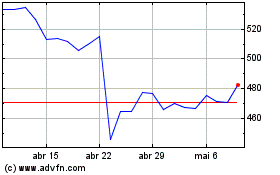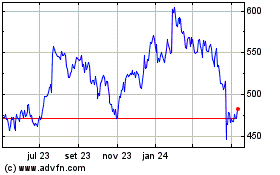When the S&P 500 Breaks Out REITs, You May Get a Tax Bill
08 Julho 2016 - 12:39PM
Dow Jones News
By Laura Saunders
A historic change is coming to the S&P 500 and MSCI Inc.
indexes on Sept. 16, when publicly traded real-estate investment
trusts move out of the financial-services sector and into a sector
of their own.
"The average investor has no idea what's going on, but this is a
big shift," says Robert Gordon, who heads Twenty-First Securities,
a brokerage firm in New York known for its tax strategies.
The REITs moving into their own category had a market value of
$609 billion on June 30 and account for about 20% of the
financial-services sector of the S&P 500.
Investors who hold financial-sector funds in taxable accounts --
as opposed to tax-sheltered retirement accounts such as IRAs --
should consider two questions ahead of the change, says Mr.
Gordon.
The first is whether they will face a surprise tax bill if a
financial-sector fund sells its REITs in order to conform to the
shift in the index.
In addition, investors should ask what will happen to their
current REIT exposure -- will it drop because the fund manager has
sold REIT shares in order to stay aligned with the financial-sector
index, which has mostly banks, insurers and asset managers? This
change could make a difference. REITs averaged a 9.8% return
annually since mid-2008, far outstripping the 3.5% returned by bank
stocks, according to Morningstar analyst Alex Bryan.
For investors concerned about taxes and future allocations, much
depends on how a fund handles details of the shift -- and different
funds are taking different approaches.
To some , the change won't matter. Gabe Solomon, who manages T.
Rowe Price's $550 million Financial Services fund, says the fund
doesn't track the affected benchmarks and plans to make no changes
based on them. Recently, about 4% of the fund's assets were in
REITs.
Funds that closely track the S&P 500 and MCSI benchmarks
must reckon with the change, however. The largest is the $14.5
billion Financial Select Sector SPDR exchange-traded fund,
sponsored by State Street Global Advisors.
Given its outsized share of the sector, the fund's managers are
working for a smooth transition, says Dave Mazza, head of
exchange-traded fund research at SSGA. They plan to split the fund
proportionally for holders of record as of Sept. 21. Investors will
wind up with two holdings, each mirroring the new S&P
benchmarks, and perhaps a small amount of taxable income.
The REIT assets will be paid out via a special dividend
consisting of shares in the new REIT ETF on Sept. 22, and this
distribution could be largely nontaxable because it counts as a
return of capital to investors. The income payment, which will be
determined closer to the breakup date and is due to fractional
shares and other issues, will be taxable at ordinary rates.
What happens to the investor's cost basis -- the starting point
for measuring taxable gain? For the REIT shares, it will be the
value on the date they are paid out. Investors' basis in the
financial-sector ETF shares will be reduced by that value to
account for the distribution of the REIT shares.
Mr. Gordon says this format allows investors both "to keep their
allocations intact and avoid a large tax bill on the change."
Other financial-sector funds, including those sponsored by
Vanguard Group, Guggenheim Investments, and Fidelity Investments,
will be selling their REITs before the index's September change --
so investors who want to maintain REIT exposure will need to
replace it with a separate purchase.
A spokesman for Vanguard said the change in its $3.3 billion
Vanguard Financials ETF and $3.6 billion Vanguard Financial index
fund are "not expected to result in capital-gains
distributions."
A spokesman for Guggenheim's S&P 500 Equal Weight Financial
ETF, with total assets of $151 million, said it also doesn't expect
the sale of the REIT shares to generate capital-gains payouts.
The two Fidelity funds that are rebalancing out of REIT holdings
are Fidelity Select Financial Services Portfolio, an open-end fund
with $1.1 billion in assets, and the Fidelity MSCI Financials Index
ETF, with $245 million in assets. According to a statement from the
firm, "it is too early to say exactly what the tax implications
will be of any repositioning" but "we manage our products with an
eye toward minimizing any tax consequences."
Write to Laura Saunders at laura.saunders@wsj.com
(END) Dow Jones Newswires
July 08, 2016 11:24 ET (15:24 GMT)
Copyright (c) 2016 Dow Jones & Company, Inc.
MSCI (NYSE:MSCI)
Gráfico Histórico do Ativo
De Jun 2024 até Jul 2024

MSCI (NYSE:MSCI)
Gráfico Histórico do Ativo
De Jul 2023 até Jul 2024
